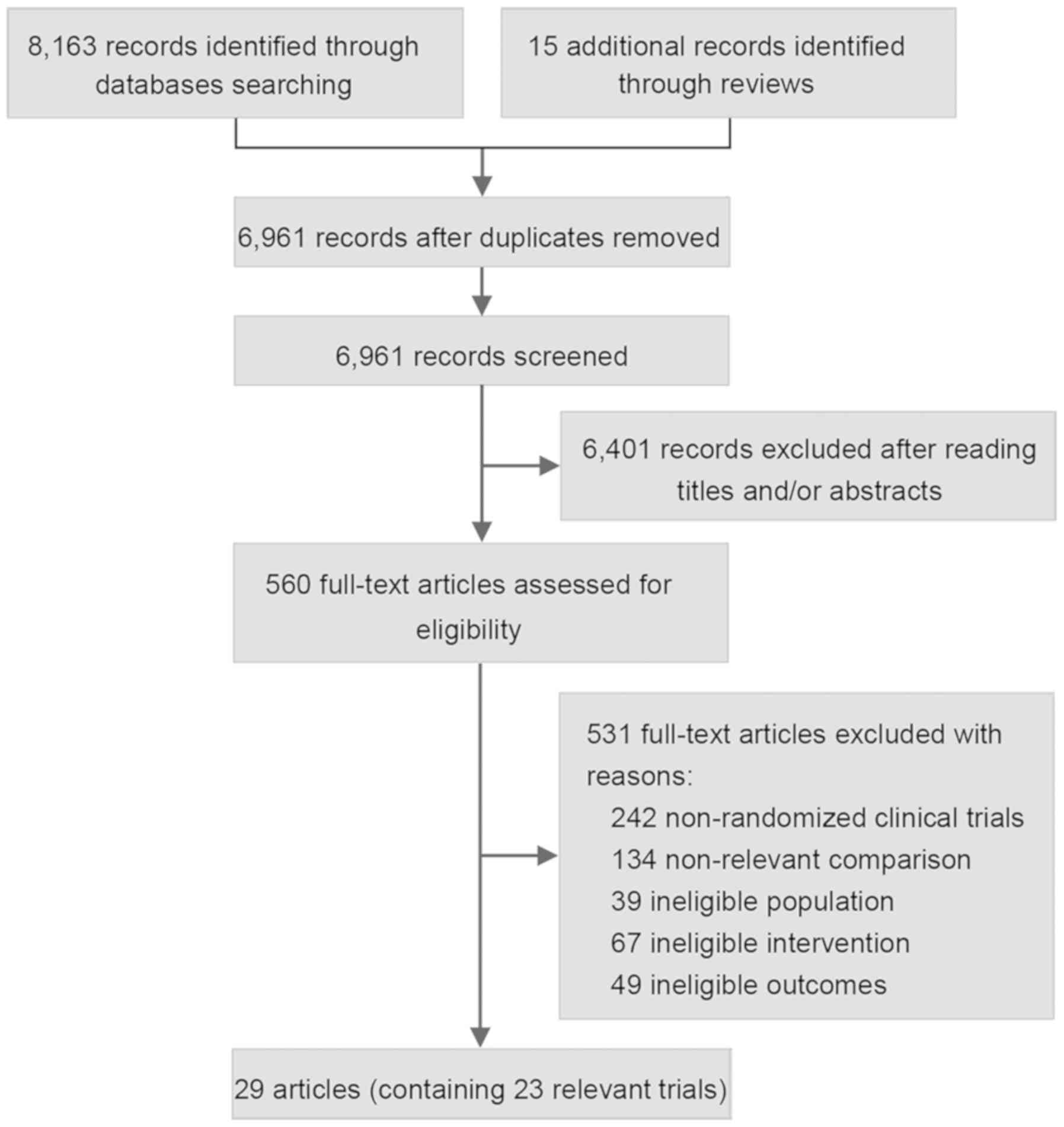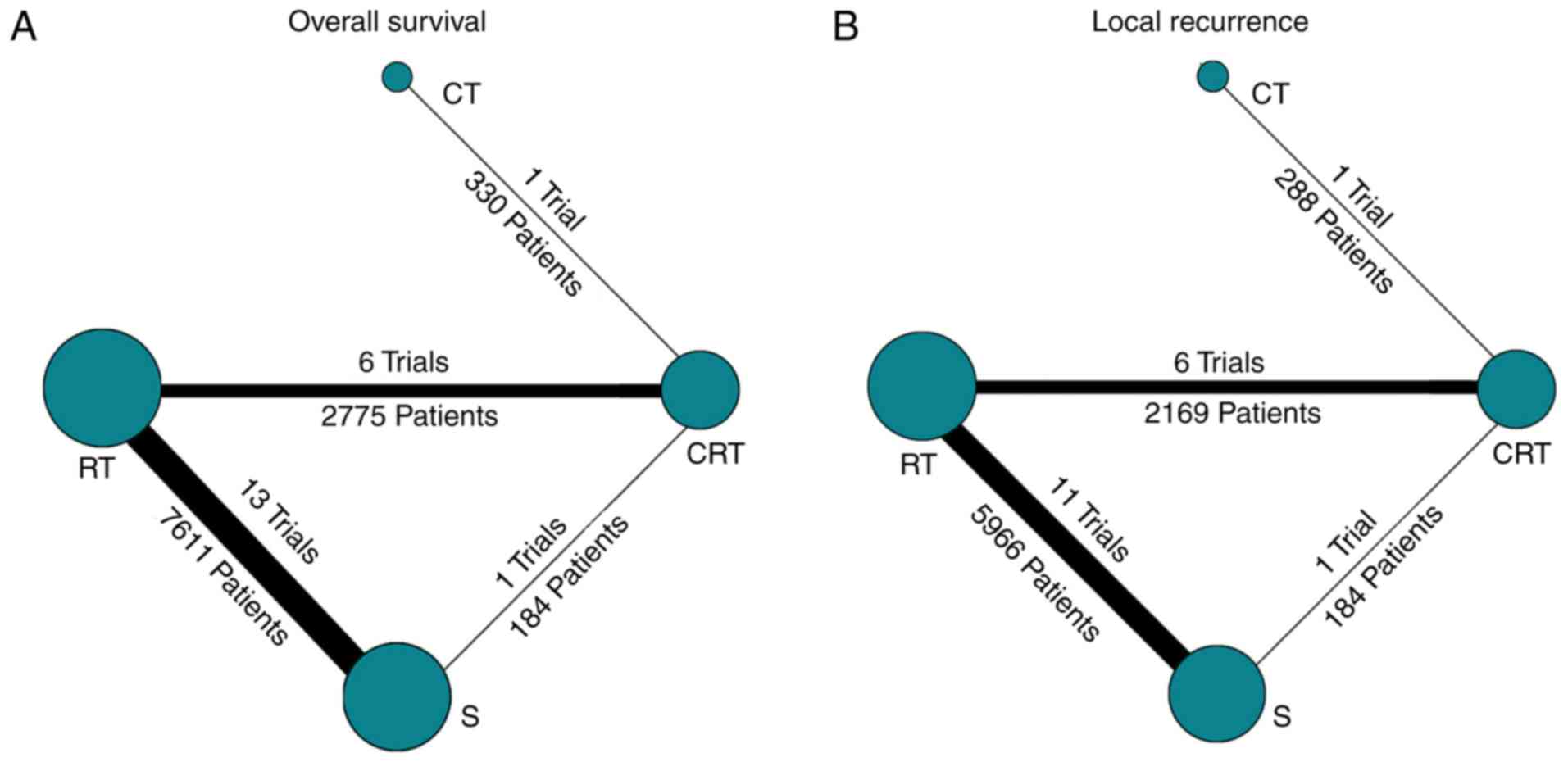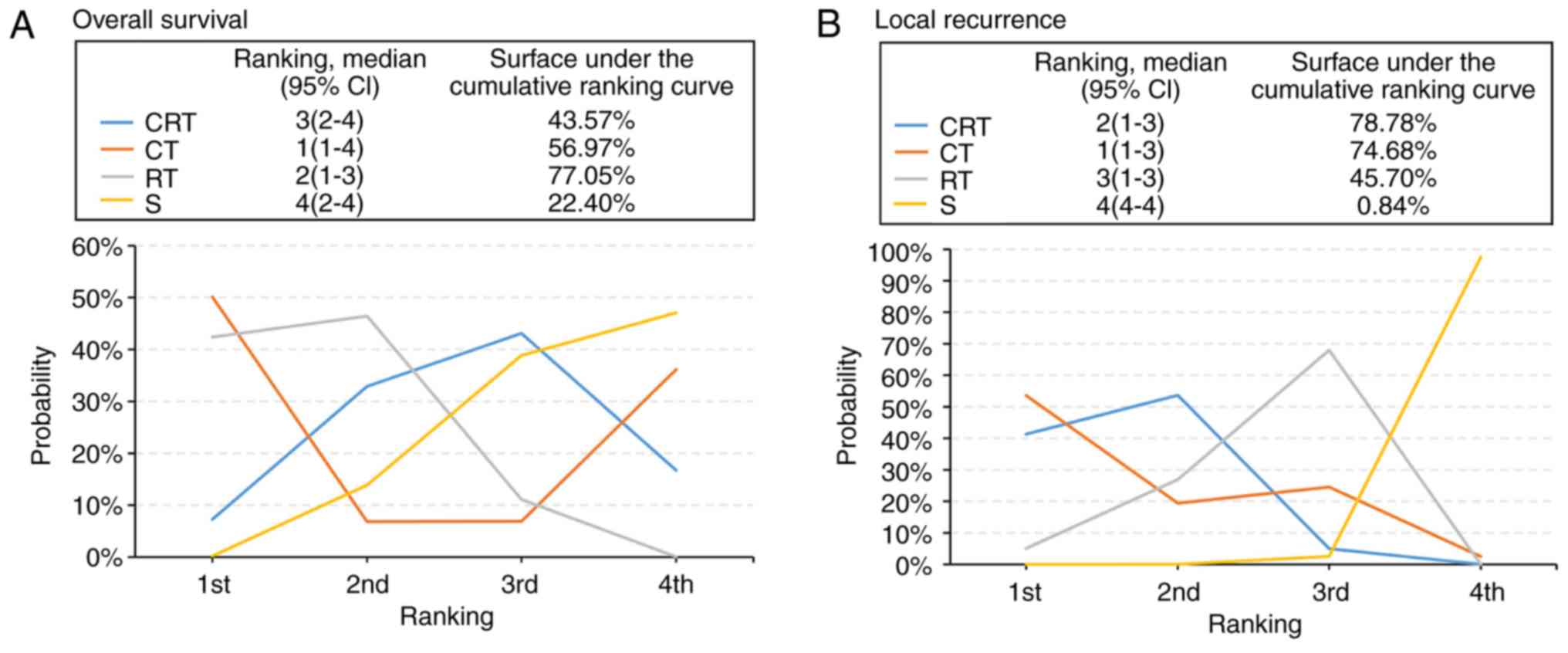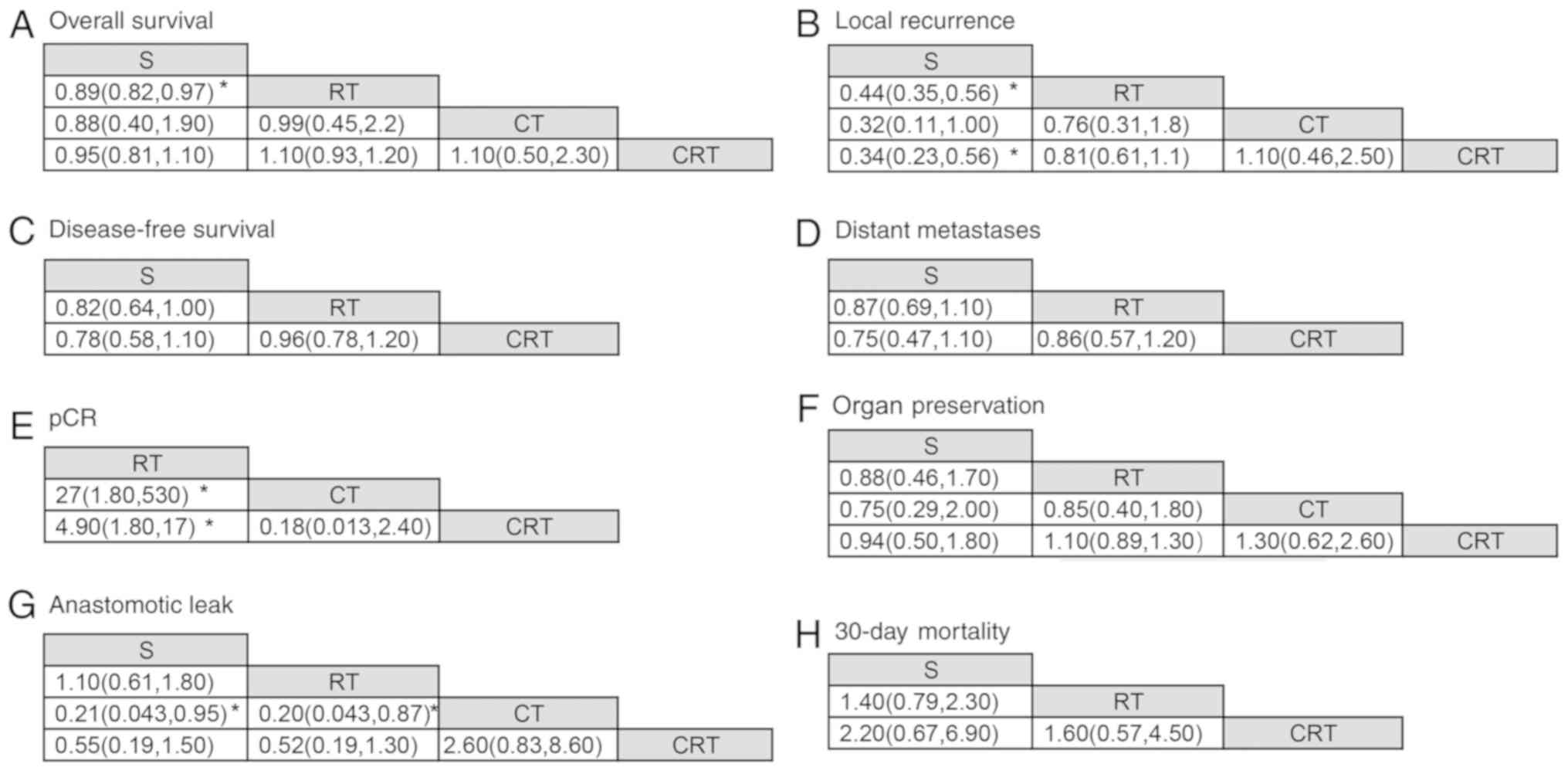|
1
|
Siegel RL, Miller KD, Fedewa SA, Ahnen DJ,
Meester RGS, Barzi A and Jemal A: Colorectal cancer statistics,
2017. CA Cancer J Clin. 67:177–193. 2017.PubMed/NCBI View Article : Google Scholar
|
|
2
|
Stintzing S: Management of colorectal
cancer. F1000Prime Rep. 6(108)2014.PubMed/NCBI View
Article : Google Scholar
|
|
3
|
Cammà C, Giunta M, Fiorica F, Pagliaro L,
Craxì A and Cottone M: Preoperative radiotherapy for resectable
rectal cancer: A meta-analysis. JAMA. 284:1008–1015.
2000.PubMed/NCBI View Article : Google Scholar
|
|
4
|
Young PE, Womeldorph CM, Johnson EK,
Maykel JA, Brucher B, Stojadinovic A, Avital I, Nissan A and Steele
SR: Early detection of colorectal cancer recurrence in patients
undergoing surgery with curative intent: Current status and
challenges. J Cancer. 5:262–271. 2014.PubMed/NCBI View
Article : Google Scholar
|
|
5
|
Glynne-Jones R and Kronfli M: Locally
advanced rectal cancer: A comparison of management strategies.
Drugs. 71:1153–1177. 2011.PubMed/NCBI View Article : Google Scholar
|
|
6
|
Heald RJ and Ryall RD: Recurrence and
survival after total mesorectal excision for rectal cancer. Lancet.
1:1479–1482. 1986.PubMed/NCBI View Article : Google Scholar
|
|
7
|
van Gijn W, Marijnen CA, Nagtegaal ID,
Kranenbarg EM, Putter H, Wiggers T, Rutten HJ, Påhlman L, Glimelius
B and Van de Velde CJ: Dutch Colorectal Cancer Group: Preoperative
radiotherapy combined with total mesorectal excision for resectable
rectal cancer: 12-year follow-up of the multicentre, randomised
controlled TME trial. Lancet Oncol. 12:575–582. 2011.PubMed/NCBI View Article : Google Scholar
|
|
8
|
Bujko K, Nowacki MP, Nasierowska-Guttmejer
A, Michalski W, Bebenek M and Kryj M: Long-term results of a
randomized trial comparing preoperative short-course radiotherapy
with preoperative conventionally fractionated chemoradiation for
rectal cancer. Br J Surg. 93:1215–1223. 2006.PubMed/NCBI View
Article : Google Scholar
|
|
9
|
MERCURY Study Group: Diagnostic accuracy
of preoperative magnetic resonance imaging in predicting curative
resection of rectal cancer: Prospective observational study. BMJ.
333(779)2006.PubMed/NCBI View Article : Google Scholar
|
|
10
|
Heald RJ, Moran BJ, Ryall RD, Sexton R and
MacFarlane JK: Rectal cancer: The Basingstoke experience of total
mesorectal excision, 1978-1997. Arch Surg. 133:894–899.
1998.PubMed/NCBI View Article : Google Scholar
|
|
11
|
Ceelen WP, Van Nieuwenhove Y and Fierens
K: Preoperative chemoradiation versus radiation alone for stage II
and III resectable rectal cancer. Cochrane Database Syst Rev.
CD006041:2009.PubMed/NCBI View Article : Google Scholar
|
|
12
|
Marsh PJ, James RD and Schofield PF:
Adjuvant preoperative radiotherapy for locally advanced rectal
carcinoma. Results of a prospective, randomized trial. Dis Colon
Rectum. 37:1205–1214. 1994.PubMed/NCBI View Article : Google Scholar
|
|
13
|
Dahl O, Horn A, Morild I, Halvorsen JF,
Odland G, Reinertsen S, Reisaeter A, Kavli H and Thunold J:
Low-dose preoperative radiation postpones recurrences in operable
rectal cancer. Results of a randomized multicenter trial in western
Norway. Cancer. 66:2286–2294. 1990.PubMed/NCBI View Article : Google Scholar
|
|
14
|
Swedish Rectal Cancer Trial, Cedermark B,
Dahlberg M, Glimelius B, Påhlman L, Rutqvist LE and Wilking N:
Improved survival with preoperative radiotherapy in resectable
rectal cancer. N Engl J Med. 336:980–987. 1997.PubMed/NCBI View Article : Google Scholar
|
|
15
|
Boulis-Wassif S, Gerard A, Loygue J,
Camelot D, Buyse M and Duez N: Final results of a randomized trial
on the treatment of rectal cancer with preoperative radiotherapy
alone or in combination with 5-fluorouracil, followed by radical
surgery. Trial of the European organization on research and
treatment of cancer gastrointestinal tract cancer cooperative
group. Cancer. 53:1811–1818. 1984.PubMed/NCBI View Article : Google Scholar
|
|
16
|
Onaitis MW, Noone RB, Hartwig M, Hurwitz
H, Morse M, Jowell P, McGrath K, Lee C, Anscher MS, Clary B, et al:
Neoadjuvant chemoradiation for rectal cancer: Analysis of clinical
outcomes from a 13-year institutional experience. Ann Surg.
233:778–785. 2001.PubMed/NCBI View Article : Google Scholar
|
|
17
|
National Comprehensive Cancer Network.
Rectal cancer (version 2.2018). https://www.nccn.org/professionals/physician_gls/pdf/rectal.pdf.
Accessed July, 2018.
|
|
18
|
Latkauskas T, Pauzas H, Kairevice L,
Petrauskas A, Saladzinskas Z, Janciauskiene R, Gudaityte J,
Lizdenis P, Svagzdys S, Tamelis A and Pavalkis D: Preoperative
conventional chemoradiotherapy versus short-course radiotherapy
with delayed surgery for rectal cancer: Results of a randomized
controlled trial. BMC Cancer. 16(927)2016.PubMed/NCBI View Article : Google Scholar
|
|
19
|
Gérard JP, Conroy T, Bonnetain F, Bouché
O, Chapet O, Closon-Dejardin MT, Untereiner M, Leduc B, Francois E,
Maurel J, et al: Preoperative radiotherapy with or without
concurrent fluorouracil and leucovorin in T3-4 rectal cancers:
Results of FFCD 9203. J Clin Oncol. 24:4620–4625. 2006.PubMed/NCBI View Article : Google Scholar
|
|
20
|
Deng Y, Chi P, Lan P, Wang L, Cui L, Chen
D, Cao J, Wei H, Peng X, Cai G, et al: A multicenter randomized
controlled trial of mFOLFOX6 with or without radiation in
neoadjuvant treatment of local advanced rectal cancer (FOWARC
study): Preliminary results. J Clin Oncol. 33:2015.(In Chinese).
View Article : Google Scholar
|
|
21
|
Schrag D, Weiser MR, Goodman KA, Gonen M,
Hollywood E, Cercek A, Reidy-Lagunes DL, Gollub MJ, Shia J, Guillem
JG, et al: Neoadjuvant chemotherapy without routine use of
radiation therapy for patients with locally advanced rectal cancer:
A pilot trial. J Clin Oncol. 32:513–518. 2014.PubMed/NCBI View Article : Google Scholar
|
|
22
|
Zhang J, Huang M, Cai Y, Wang L, Xiao J,
Lan P, Hu H, Wu X, Ling J, Peng J, et al: Neoadjuvant chemotherapy
with mFOLFOXIRI without routine use of radiotherapy for locally
advanced rectal cancer. Clin Colorectal Cancer. 18:238–244.
2019.PubMed/NCBI View Article : Google Scholar
|
|
23
|
Lumley T: Network meta-analysis for
indirect treatment comparisons. Stat Med. 21:2313–2324.
2002.PubMed/NCBI View
Article : Google Scholar
|
|
24
|
Rücker G: Network meta-analysis,
electrical networks and graph theory. Res Synth Methods. 3:312–324.
2012.PubMed/NCBI View Article : Google Scholar
|
|
25
|
Tierney JF, Stewart LA, Ghersi D, Burdett
S and Sydes MR: Practical methods for incorporating summary
time-to-event data into meta-analysis. Trials. 8(16)2007.PubMed/NCBI View Article : Google Scholar
|
|
26
|
Higgins JP, Altman DG, Gøtzsche PC, Jüni
P, Moher D, Oxman AD, Savovic J, Schulz KF, Weeks L and Sterne JA:
Cochrane Bias Methods Group; Cochrane Statistical Methods Group:
The Cochrane Collaboration's tool for assessing risk of bias in
randomised trials. BMJ. 343(d5928)2011.PubMed/NCBI View Article : Google Scholar
|
|
27
|
Higgins JP and Altman DG: Assessing Risk
of Bias in Included Studies. Cochrane Handbook for Systematic
Reviews of Interventions: Cochrane Book Series: 187-241, 2008.
|
|
28
|
Guyatt GH, Oxman AD, Vist GE, Kunz R,
Falck-Ytter Y, Alonso-Coello P and Schünemann HJ: GRADE Working
Group: GRADE: An emerging consensus on rating quality of evidence
and strength of recommendations. BMJ. 336:924–926. 2008.PubMed/NCBI View Article : Google Scholar
|
|
29
|
Puhan MA, Schünemann HJ, Murad MH, Li T,
Brignardello-Petersen R, Singh JA, Kessels AG and Guyatt GH: GRADE
Working Group: A GRADE working group approach for rating the
quality of treatment effect estimates from network meta-analysis.
BMJ. 349(g5630)2014.PubMed/NCBI View Article : Google Scholar
|
|
30
|
DerSimonian R and Laird N: Meta-analysis
in clinical trials. Control Clin Trials. 7:177–188. 1986.
|
|
31
|
Brooks SP and Gelman A: General methods
for monitoring convergence of iterative simulations. J Comput
Graphical Statistics. 7:434–455. 1998. View Article : Google Scholar
|
|
32
|
Dias S, Welton NJ, Caldwell DM and Ades
AE: Checking consistency in mixed treatment comparison
meta-analysis. Stat Med. 29:932–944. 2010.PubMed/NCBI View Article : Google Scholar
|
|
33
|
Jansen JP, Fleurence R, Devine B, Itzler
R, Barrett A, Hawkins N, Lee K, Boersma C, Annemans L and
Cappelleri JC: Interpreting indirect treatment comparisons and
network meta-analysis for health-care decision making: Report of
the ISPOR task force on indirect treatment comparisons good
research practices: Part 1. Value Health. 14:417–428.
2011.PubMed/NCBI View Article : Google Scholar
|
|
34
|
Salanti G, Ades AE and Ioannidis JP:
Graphical methods and numerical summaries for presenting results
from multiple-treatment meta-analysis: An overview and tutorial. J
Clin Epidemiol. 64:163–171. 2011.PubMed/NCBI View Article : Google Scholar
|
|
35
|
Higgins GA Jr, Conn JH, Jordan PH Jr,
Humphrey EW, Roswit B and Keehn RJ: Preoperative radiotherapy for
colorectal cancer. Ann Surg. 181:624–631. 1975.PubMed/NCBI View Article : Google Scholar
|
|
36
|
Roswit B, Higgins GA and Keehn RJ:
Preoperative irradiation for carcinoma of the rectum and
rectosigmoid colon: Report of a National Veterans Administration
randomized study. Cancer. 35:1597–1602. 1975.PubMed/NCBI View Article : Google Scholar
|
|
37
|
Rider WD, Palmer JA, Mahoney LJ and
Robertson CT: Preoperative irradiation in operable cancer of the
rectum: Report of the Toronto trial. Can J Surg. 20:335–338.
1977.PubMed/NCBI
|
|
38
|
Duncan W, Smith AN, Freedman LS, Alderson
MR, Arnott SJ, Bleehen N M, Bond WH, Crowther D, Deeley TJ, Duthie
HL, et al: A trial of preoperative radiotherapy in the management
of operable rectal cancer. Br J Surg. 69:513–519. 1982.PubMed/NCBI View Article : Google Scholar
|
|
39
|
Duncan W, Smith AN, Freedman LS, Alderson
MR, Arnott SJ, Bleehen N M, Bond WH, Crowther D, Deeley TJ, Duthie
HL, et al: The evaluation of low dose pre-operative X-ray therapy
in the management of operable rectal cancer; results of a randomly
controlled trial. Br J Surg. 71:21–25. 1984.PubMed/NCBI View Article : Google Scholar
|
|
40
|
Higgins GA, Humphrey EW, Dwight RW, Roswit
B, Lee LE Jr and Keehn RJ: Preoperative radiation and surgery for
cancer of the rectum. Veterans administration surgical oncology
group trial II. Cancer. 58:352–359. 1986.PubMed/NCBI View Article : Google Scholar
|
|
41
|
Gérard A, Buyse M, Nordlinger B, Loygue J,
Pène F, Kempf P, Bosset JF, Gignoux M, Arnaud JP and Desaive C:
Preoperative radiotherapy as adjuvant treatment in rectal cancer.
Final results of a randomized study of the European organization
for research and treatment of cancer (EORTC). Ann Surg.
208:606–614. 1988.PubMed/NCBI View Article : Google Scholar
|
|
42
|
Reis Neto JA, Quilici FA and Reis JA Jr: A
comparison of nonoperative vs. preoperative radiotherapy in rectal
carcinoma. A 10-year randomized trial. Dis Colon Rectum.
32:702–710. 1989.PubMed/NCBI View Article : Google Scholar
|
|
43
|
Goldberg PA, Nicholls RJ, Porter NH, Love
S and Grimsey JE: Long-term results of a randomised trial of
short-course low-dose adjuvant pre-operative radiotherapy for
rectal cancer: Reduction in local treatment failure. Eur J Cancer.
30A:1602–1606. 1994.PubMed/NCBI View Article : Google Scholar
|
|
44
|
Cedermark B, Johansson H, Rutqvist LE and
Wilking N: The Stockholm I trial of preoperative short term
radiotherapy in operable rectal carcinoma. A prospective randomized
trial. Stockholm colorectal cancer study group. Cancer.
75:2269–2275. 1995.PubMed/NCBI View Article : Google Scholar
|
|
45
|
Oates G, Stenning S and Hardcastle J:
Randomised trial of surgery alone versus radiotherapy followed by
surgery for potentially operable locally advanced rectal cancer.
Medical research council rectal cancer working party. Lancet.
348:1605–1610. 1996.PubMed/NCBI View Article : Google Scholar
|
|
46
|
Petersen S, Hellmich G, Baumann M,
Herrmann T, Henke G and Ludwig K: Brief preoperative radiotherapy
in surgical therapy of rectal carcinoma. Long-term results of a
prospective randomized study. Chirurg. 69:759–765. 1998.(In
German). PubMed/NCBI View Article : Google Scholar
|
|
47
|
Martling A, Holm T, Johansson H, Rutqvist
LE and Cedermark B: Stockholm Colorectal Cancer Study Group: The
Stockholm II trial on preoperative radiotherapy in rectal
carcinoma: Long-term follow-up of a population-based study. Cancer.
92:896–902. 2001.PubMed/NCBI View Article : Google Scholar
|
|
48
|
Randomized study on preoperative
radiotherapy in rectal carcinoma. Stockholm colorectal cancer study
group. Ann Surg Oncol. 3:423–430. 1996.
|
|
49
|
Kapiteijn E, Marijnen CA, Nagtegaal ID,
Putter H, Steup WH, Wiggers T, Rutten HJ, Pahlman L, Glimelius B,
van Krieken JH, et al: Preoperative radiotherapy combined with
total mesorectal excision for resectable rectal cancer. N Engl J
Med. 345:638–646. 2001.PubMed/NCBI View Article : Google Scholar
|
|
50
|
Wang F, Lu ZH, Pan Z, Gao YH, Chen G, Wu
X, Ding PR, Zeng ZF and Wan D: Preoperative radiotherapy combined
with simultaneous chemotherapy with capecitabine plus oxaliplatin
versus surgery alone: A single-centered, phase II study in patients
with mid/low rectal cancer. J Clin Oncol. 32:2014.(In Chinese).
View Article : Google Scholar
|
|
51
|
Fan WH, Wang FL, Lu ZH, Pan ZZ, Li LR, Gao
YH, Chen G, Wu XJ, Ding PR, Zeng ZF and Wan DS: Surgery with versus
without preoperative concurrent chemoradiotherapy for mid/low
rectal cancer: An interim analysis of a prospective, randomized
trial. Chin J Cancer. 34:394–403. 2015.PubMed/NCBI View Article : Google Scholar
|
|
52
|
Bosset JF, Collette L, Calais G, Mineur L,
Maingon P, Radosevic-Jelic L, Daban A, Bardet E, Beny A and Ollier
JC: EORTC Radiotherapy Group Trial 22921: Chemotherapy with
preoperative radiotherapy in rectal cancer. N Engl J Med.
355:1114–1123. 2006.PubMed/NCBI View Article : Google Scholar
|
|
53
|
Bosset JF, Calais G, Mineur L, Maingon P,
Radosevic-Jelic L, Daban A, Bardet E, Beny A, Briffaux A and
Collette L: Enhanced tumorocidal effect of chemotherapy with
preoperative radiotherapy for rectal cancer: Preliminary
results--EORTC 22921. J Clin Oncol. 23:5620–5627. 2005.PubMed/NCBI View Article : Google Scholar
|
|
54
|
Ngan SY, Burmeister B, Fisher RJ, Solomon
M, Goldstein D, Joseph D, Ackland SP, Schache D, McClure B,
McLachlan SA, et al: Randomized trial of short-course radiotherapy
versus long-course chemoradiation comparing rates of local
recurrence in patients with T3 rectal cancer: Trans-tasman
radiation oncology group trial 01.04. J Clin Oncol. 30:3827–3833.
2012.PubMed/NCBI View Article : Google Scholar
|
|
55
|
Higgins JPT and Green S (eds): Cochrane
handbook for systematic reviews of interventions, version 5.1.0
(updated Marh 2011). The Cochrane Collaboration 2011.
|
|
56
|
Wong RK, Tandan V, De Silva S and
Figueredo A: Pre-operative radiotherapy and curative surgery for
the management of localized rectal carcinoma. Cochrane Database
Syst Rev. CD002102:2007.PubMed/NCBI View Article : Google Scholar
|
|
57
|
Rahbari NN, Elbers H, Askoxylakis V,
Motschall E, Bork U, Buchler MW, Weitz J and Koch M: Neoadjuvant
radiotherapy for rectal cancer: Meta-analysis of randomized
controlled trials. Ann Surg Oncol. 20:4169–4182. 2013.PubMed/NCBI View Article : Google Scholar
|
|
58
|
Latkauskas T, Paskauskas S, Dambrauskas Z,
Gudaityte J, Saladzinskas S, Tamelis A and Pavalkis D: Preoperative
chemoradiation vs radiation alone for stage II and III resectable
rectal cancer: A meta-analysis. Colorectal Dis. 12:1075–1083.
2010.PubMed/NCBI View Article : Google Scholar
|


















